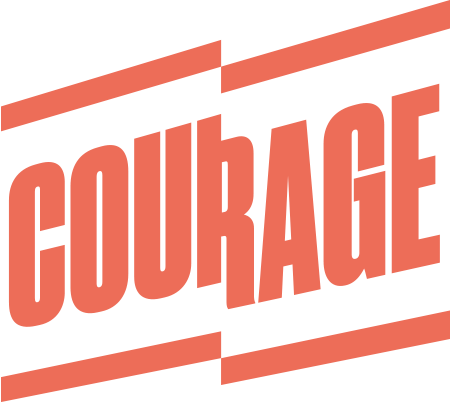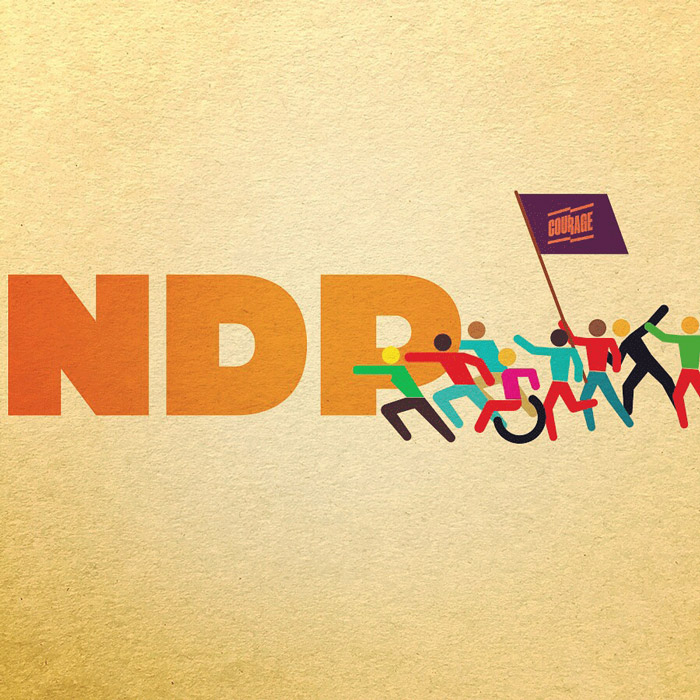The NDP leadership race
Our analysis
In July of this year, Courage members voted in an internal referendum to determine how best to intervene in the upcoming federal NDP leadership election. Options on the ballot were:
1. Endorsement: recommendation of a particular candidate
2. Scorecard: a ranking of each candidate against Courage’s Basis of Unity
3. Analysis: a neutral examination of the candidates against Courage’s Basis of Unity
The results of the vote were close, but the majority of the membership did favour Option 3: Analysis. It is in recognition of that decision that we present our analysis of the NDP leadership race, measured primarily against Courage’s ‘Basis of Unity’, as well as on a broader leftist perspective. Our Basis of Unity comprises the core values that Courage’s members agree upon and support, and includes such demands as; democratic control over our economy; a society which includes and empowers all people, regardless of race, gender, sexuality, religion or class; environmental sustainability; international solidarity with oppressed people everywhere, including the Palestinian people and all migrants and refugees; decolonization and self-determination for Indigenous peoples everywhere; and inclusive and asymmetrical federalism. We offer our survey of the four leadership campaigns as interpreted through this unique lens. This analysis will not however address issues of personality such as popular appeal and charisma, as it is our feeling that these aspects have been given adequate coverage in other sources. It is important to note that our survey is not exhaustive—it leaves out policies for all of the candidates—and as it is the work of a collective it will not align perfectly with the views of any one member.
A note on foreign policy: at the time of writing none of the campaign platforms contained significant foreign policy, nor has there been a debate dedicated to the subject; a glaring oversight on the part of the candidates and also the party. An area where there is some distinction between the candidates is on the subject of Israel and Palestine. As the plight of the oppressed is of special interest to Courage, and as pro-Palestinian candidates have been known to be “turfed” by the NDP, a decision was made to limit our foreign policy analysis to where the candidates stand on this issue. We feel it necessary to point out that criticism of the State of Israel does in no way equal anti-semitism, and that Courage stands strongly against racism in all its forms.
Charlie Angus
Charlie Angus is the veteran in the NDP leadership contest, elected as an Ontario MP in 2004. Being the second to declare (after Peter Julian, who has since dropped out) and thought to be the initial frontrunner, the Angus campaign has presented its candidate as a champion for the typical Canadian, the worker: Charlie “has your back.” Angus does have a solid history organizing for social justice—particularly in championing Indigenous issues—that backs up this claim.
On the environment, Angus would like to eliminate subsidies for fossil fuel industries, and legislate a “hard-cap” on emissions over a five-year period, but has not taken a particularly hard stance against pipelines, with the Hill-Times identifying him as the “most pipeline friendly candidate” in the race. This conclusion, however, is contradicted by his passionate advocacy for Indigenous peoples, his commitment to implement the United Nations Declaration on the Rights of Indigenous Peoples (UNDRIP) and to not oppose Indigenous rights in court. Angus also aims to promote Indigenous child welfare, work to hand over programs to Indigenous communities and improve access to housing and education.
Angus’ platform offers no specific gender-based or LGBTQ+ policy, and while thin on migrant rights, he does promise to fund EAL programming, employment assistance and other services. On Palestine, he has criticized Israel on the issue of settlements, supports the labelling of goods originating in the occupied territories, and opposed parliamentary condemnation of the Boycott, Divestment, Sanctions (BDS) movement, though it should be noted he does not support boycotts or sanctions against Israel.
Apart from not presenting a taxation plan, Angus has advanced strong economic proposals, pledging to increase the federal minimum wage to $15 per hour, introduce anti-scab legislation, and—of particular interest to Courage—to create a program which would make it easier for urban neighbourhoods to set up democratically controlled cooperative enterprises. Among other progressive housing initiatives (a $1.1 billion low income housing benefit, $2 billion to social housing) he also pledges to expand cooperative housing, promoting democratic control of local resources and community land trusts. We view cooperatives as a key element in the transition to a democratically controlled economy; any program that encourages their development is something that we support. [*]
While Angus has made a return of the party to its grassroots base a central promise of his campaign—commendably promising to hire regional organizers for example—some in the party have alluded to a troubling tendency toward autocratic rule during his time as caucus chair. This potentially represents a weakness in what one could reasonably expect to be Angus’ strongest area—intra-party relationships and support. Additionally, given Courage’s stance on improving internal democracy within the NDP, any notion of a ‘top-down’ leadership style is cause for concern.
Niki Ashton
On the issue of strengthening the internal democracy of the NDP, Manitoba MP Niki Ashton has pledged to make the NDP a ‘bottom-up’ organization in which left-wing grassroots organizations and activists have a greater say in policy and direction of the party. The candidate in the NDP leadership race to most vocally identify as a democratic socialist, Ashton’s campaign messaging and rhetoric has for the most part supported that label.
Ashton supports public ownership and democratization of the economy through the nationalization of key sectors—though she has not been thoroughly specific on her plans to do so. Likening herself to Jeremy Corbyn and Bernie Sanders, Ashton has also promised free post-secondary education, offered positive gender-based policy such as a well-funded national action plan on gender-based violence, and plans to take “decisive action” on employment discrimination against gendered, Indigenous, racialized and LGBTQ+ persons. It should be noted here that some have found Ashton lacking in her allyship; during and after the Victoria debate, the issue of Ashton’s blatant cherry-picking of quotes to misrepresent candidate Jagmeet Singh’s stance on LGBTQ+ changes to Ontario’s sex-ed curriculum was the subject of critique from both party members and the media.
Ashton’s tax reform plan is ambitiously redistributive, seeking to close loopholes and ensure corporations and the wealthiest 1% of Canadians pay a commensurate rate by limiting capital gains tax exemptions and increasing wealth and estate taxes. She also proposes the creation of a Postal Bank, and an end to corporate giveaways and trade deals which benefit executives and corporations over workers here and across the world—though again without a great deal of specificity. Through aggressive taxation and a plan to end corporate subsidies, Ashton proposes a robust climate justice plan, including green job guarantees, retraining for oil sector workers, a national retrofit strategy, phasing out the sale of gas and diesel vehicles by 2040, and the creation of a new crown corporation to lead a green energy transition.
On support of oppressed peoples, Ashton has been vocal on Indigenous rights in Canada—particularly around Missing and Murdered Indigenous Women (MMIW), increasing funding for Indigenous education, and issues of access in the North—and has taken a bold position on Israel’s treatment of Palestinians. While Ashton has not officially endorsed BDS, she does support it, and we acknowledge her strong defence of the Palestinian people. She also maintains a clear pro-migrant rights and pro-refugee position, and opposes military expansionism.
Guy Caron
The role of economic steward has been assumed by Québec MP Guy Caron in this campaign, who has made his Basic Income Guarantee the signature component of his platform. A guaranteed basic income as implemented by a Caron-led government would be a supplement provided by the state, serving as a top-up to help low-income Canadians reach the so-called ‘low-income cut-off’ (LICO) line. Guaranteed basic income is regarded with mixed opinions on the left: there are some who see it as ameliorative; a good first step toward alleviating some of the cruelest effects of income and wealth inequality. Others view it as possible ammunition for conservatives to point to as justification for cutting—or even eliminating entirely—the broader social support offered by the state. It should be noted that Caron has gone on record stating that his approach is definitively ameliorative, however more clarity is needed with regard to how his Basic Income Guarantee would interact with other social programs such as daycare or tuition-relief. Further to the economy, Caron also promises an ambitious taxation plan which aims in part to net $2 billion from a new inheritance tax and $12 billion from a new wealth tax.
Caron has pushed electoral reform to the top of his campaign’s agenda, promising that the first piece of legislation in a Caron government would be to institute Mixed Member Proportional Representation (MMPR) as Canada’s new electoral system. While we applaud this, it should be noted that MMPR has been promoted by all of the candidates as the system with which they would replace Canada’s current First-Past-The-Post (FPTP) electoral system, and that doing so is already official NDP policy.
Often overshadowed by his Basic Income Guarantee, Caron’s environmental plan is significant. He opposes the Kinder Morgan, Energy East and Keystone XL pipeline projects, and like the other candidates, he plans to end fossil fuel subsidies. Caron also wants 50% of vehicles on the road by 2041 to be electric, and would create a Secretariat to coordinate this electrification strategy by incentivizing electric vehicle purchases. Additionally, Caron promises that a government under his leadership would invest in green infrastructure projects, immediately begin accepting climate change migrants, and would align the National Energy Board with the Paris Agreement and UNDRIP. Further to UNDRIP, Caron pledges to implement it as law in Canada, as well as adopting and implementing all the recommendations from the Truth and Reconciliation Commission of Canada (TRC). He also plans to reset and modify the National Inquiry into MMIW and seek a new nation-to-nation dialogue with Indigenous peoples around revenue sharing from resource extraction, which are all positive efforts. Caron’s stance on Palestine earns mixed reviews from the left, in that while he voted against a Parliamentary motion to condemn BDS, he remains unsure that it is a constructive method of intervention. Lastly, the Caron platform has offered no specific LGBTQ+ or gender-based policy.
In August, the Caron campaign released a Québec policy platform that pledged to respect the Québec legislature’s “authority” to pass laws on secularism, citing an alleged emerging consensus from both the left and right in that province on legislation that would impose limits on religious clothing, such as niqabs and burkas (candidate Niki Ashton also initially agreed with this approach before later changing position, calling restrictions on clothing “a line in the sand”). It is worth noting here that a theory held by many in the pundit class that Thomas Mulcair’s position against the niqab ban ultimately cost the NDP Québec in the 2015 federal election. We must be clear: Courage absolutely condemns the process of “othering” in any case, and doing so in a misguided attempt to gain political favour in a particular province or region is no exception to this condemnation.
Jagmeet Singh
A frontrunner in the campaign even before he declared, Singh has been called the candidate to beat—that observation seemingly borne out by his being the frequent locus of the most heated leadership debates. Initially, the national press’ interest in Singh tended to be based more on style than substance, presenting him as an NDP answer to the Liberal’s Trudeau. That thought was of little comfort to many on the Canadian left, some of whom were already concerned that Singh would skew towards centrism in a bid to power. This concern momentarily appeared warranted early in the campaign when Singh refused to rule out support for the Kinder Morgan pipeline, though he did eventually release a climate change plan that opposes both the Energy East and Kinder Morgan pipeline projects, and more recently has also come out against Keystone XL. Singh’s climate change plan includes a Green Building Compact, the phasing out of coal, a new tax on high emission vehicles, fossil fuel worker retraining and a commitment to UNDRIP. It should be mentioned here that other than his commitment to UNDRIP, there was a notable lack of any other Indigenous policy in the Singh platform until after online voting began [*], and Courage would also like to see a clearer policy on immigration/citizenship from his campaign.
The strongest policies in Singh’s platform are in the area of justice, as one might expect from a former criminal justice lawyer. For example, his Racial Justice Agenda calls for a federal ban on racial profiling and street checks (‘carding’), the uprooting of systemic discrimination within the criminal justice system, and an examination of the collection of race-based data—all actions that Courage agrees are long overdue. Singh’s Criminal Justice Reform Agenda is equally ambitious, with key plans being the full decriminalization of all drugs and the decriminalization of sex work. The Singh platform contains a number of positive LGBTQ+ initiatives such as repealing the blood ban and requiring LGBTQ+ training for the CBSA and RCMP, and has recently added a gender-based violence policy [*].
It has been mentioned that as the campaign has progressed, Singh has moved leftward in his policy decisions, recently promising free post-secondary education being one notable and welcome example. As well, his pledges to increase the capital gains tax from 50% to 75%, to impose an estate tax of 40% on assets over $4 million dollars, and to introduce higher tax brackets on incomes of $350K and $500K are welcome efforts at redistribution. On the issue of Palestine, Singh spoke out against a motion in the Ontario Legislature to condemn BDS, citing it as an attack on free speech and criticism of government. He also supports a labelling regime on goods imported from Israeli settlements in the occupied territories.
Finally, it is no secret that Courage in its earlier incarnation—Renewal—was a key player in the grassroots-led ouster of Tom Mulcair as leader of the NDP at the 2016 party convention in Edmonton, and tentative embrace of the Leap Manifesto. That move pitted us against the will of the NDP establishment. With that and our commitment to restoring internal democracy in mind, the presence of party establishment figures (e.g., Brad Lavigne, James Pratt) among Jagmeet Singh’s supporters remains an area of concern to us.
Racial discrimination in the leadership campaign
Before closing, it is profoundly important that we highlight the racism Jagmeet Singh has been forced to endure during this campaign, both from outside the party—such as the infamous racist verbal assault at a campaign stop in Brampton, Ontario—but also from within. We must be clear that Courage will not tolerate racism in any form, be it in the form of race-baiting campaign tactics, or in letting racism, xenophobia or Islamophobia slide in an ill-advised desire to appeal to “the Québec vote.” We also reject the notion that racism, xenophobia and Islamophobia are problems that are somehow unique to Québec—these despicable traits are present in all corners of Canada and must be fought and educated against with urgency. We must be loudly and actively anti-racist.
Toward a better world
Widening global economic inequality, civil war, famine, cataclysmic weather events, hideous demonstrations of fascist politics, mass killing in Yemen, the Philippines, Myanmar—each day reinforces that we as a species face critical, structural crises. In response to these, we are given two options; we can devour one another in a desperate scramble to hoard what resources remain, or we can revolutionize our systems of social organization and interaction to create a world wherein wellbeing and prosperity are truly shared among all.
If there was ever an appetite for unabashed leftism the world over—and a truly leftist NDP in Canada—this is it.
[ * After this document was finalized for review by our membership on September 18, several campaigns have released new policy that could alter elements of our analysis. Due to time constraints, we were not able to analyze the further information, but areas that we highlighted include the Charlie Angus campaign with a new Justice policy, and the Jagmeet Singh campaign with a new Indigenous policy as well as a new Gender-Based Violence policy and encourage readers to link to these additions ]




